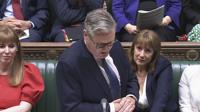LONDON (AP) — The weekly session in which the British prime minister is questioned by lawmakers in Parliament can be an ordeal for the government leader. For Cabinet members, it’s usually simply a matter of backing their boss.
But on Wednesday the spotlight ended up on Chancellor of the Exchequer Rachel Reeves during the Prime Minister's Questions session because it became evident that she was crying as she sat beside Prime Minister Keir Starmer.
It's not known what triggered the tears, later said to have been personal. They came as Starmer sought to fend off attacks that his year-old government was losing its authority and that he was about to fire Reeves to regain the initiative.
Markets spooked
Traders got spooked, with the interest rate charged on the U.K.’s 10-year benchmark bond in the markets up sharply, and the pound down. The moves were a sign investors had lost confidence in U.K. financial assets.
Reeves had become associated with fiscal discipline, in particular a rule of covering day-to-day government spending with tax revenue, said Andrew Wishart, an economist at Berenberg Bank.
“The markets are concerned that if the Chancellor goes, such fiscal discipline would follow her out of the door," he added.
With Starmer insisting Thursday that Reeves would remain in post, the markets calmed down.
Prime minister's weekly ordeal
Prime Minister's Questions, or PMQs, can come as close to a gladiatorial contest as is possible in a modern legislative chamber. Very little deference is given to the man or woman holding the highest office in the land.
The prime minister is considered the first among equals. Like all other members of Parliament, the prime minister represents one of 650 constituencies. And nowhere is that shared connection more noticeable than at noon every Wednesday in the House of Commons.
Starmer stands for half an hour every week to be quizzed by friends and foes. He may get soft balls, but there's always a potential zinger around the corner.
The leader of the biggest opposition party, currently the Conservative Party's Kemi Badenoch, has the best chance to knock the prime minister off course. With six questions, she can lay traps and go for the jugular.
Typically it's more theater than substance, and the weekly shouting match is consistently the most-watched parliamentary event, viewed around the world, including on C-Span in the United States.
This week was fraught
This week's session appeared to have more at stake than usual following a chaotic run-up to a welfare reform bill. With scores of Labour lawmakers opposed, Starmer was forced to scrap key planks of the bill — at a cost, politically and economically.
For a prime minister, with one of the biggest majorities in history, it was a sign of weakness.
Many Labour MPs blame Reeves, for her rigid adherence to her budget rules.
As usual, Starmer was flanked to his left by Reeves, who didn't look her usual self, clearly bloated around the eyes.
Badenoch showed little mercy, describing Reeves as “absolutely miserable” and a “human shield” for Starmer. She asked Starmer whether he could repeat a pledge that Reeves would stay in her post until the general election, which has to take place by the middle of 2029.
While praising Reeves' handling of the economy, Starmer didn't give that assurance, and it was around this point that Reeves wiped away a tear.
“How awful for the Chancellor that he couldn’t confirm that she would stay in place," Badenoch responded.
The immediate political aftermath
Starmer's Downing Street operation faced questions over Reeves' teary appearance. Could it have been hay fever? Had Starmer told Reeves she would be fired for the government's recent woes, which has seen Labour's approval ratings slide?
Starmer's press spokesman said it was a “personal matter,” insisted Reeves was “going nowhere” and had the prime minister's “full backing.”
Later, Starmer told the BBC that Reeves would be Chancellor for a “very long time” and that it was “absolutely wrong” to suggest her distress was related to the welfare U-turn.
A day on
Images of Reeves' agitated state were emblazoned across newspapers and remained a key item on the news agenda.
Starmer repeated on Thursday that Reeves would remain Chancellor “for years to come" and sought to explain why he hadn't comforted Reeves during PMQs.
“In PMQs, it is bang, bang, bang," he said at an event where he and Reeves hugged. "That’s what it was yesterday and therefore I was probably the last to appreciate anything going on in the chamber.”
Reeves appeared more like her usual self.
“People saw I was upset, but that was yesterday," she told Sky News. “I guess the thing that is different from my job and many of your viewers is that when I’m having a tough day, it’s on the telly.”











